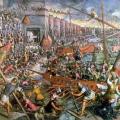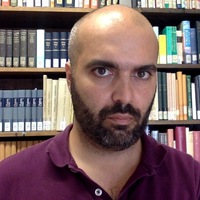327. Michele Trizio on Byzantine and Latin Medieval Philosophy
The series on Byzantium concludes as guest Michele Trizio discusses the mutual influence of Byzantium and Latin Christendom.
Themes:
• M. Trizio, “Byzantine Philosophy as a Contemporary Historiographical Project,” Recherches de Théologie et Philosophie Médiévales 74 (2007), 247-94.
• M. Trizio, “Neoplatonic Source-Material in Eustratios of Nicaea’s Commentary on Book VI of the Nicomachean Ethics,” in C. Barber and D. Jenkins (eds), Medieval Greek Commentaries on the Nicomachean Ethics (Leiden: 2009), 71-109.
• M. Trizio, “From Anna Komnene to Dante: The Byzantine Roots of Western Debates on Aristotle’s Nicomachean Ethics,” in J.M. Ziolkowski (ed.), Dante and the Greeks (Washington DC: 2014), 105-40.
• M. Trizio, Il neoplatonismo di Eustrazio di Nicea (Bari: 2016).
• M. Trizio, “Reading and Commenting on Aristotle,” in A. Kaldellis and N. Siniossoglou (eds), The Cambridge Intellectual History of Byzantium (Cambridge: 2017), 397-412.
• M. Trizio, “Byzantine interpretations of NE 6.5.1140b17-18,” in J. Fink (ed.), Phantasia in Aristotle's Ethics Reception in the Arabic, Greek, Hebrew and Latin Traditions (London: 2019), 65-77.






Comments
Amazing mutual influences
It is really amazing how the Latin West and the Byzantine World influenced each other, and finally the comparison of the Renaissance with Al-Andalus is very interesting, too. I have a strong feeling that a comparison of them both, and with the House of Wisdom / Translation Movement in Bagdad could shed light on some very interesting common aspects as well as differences. This podcast endangers you clearly to stimulate new thinking :-)
Query
Hello Peter,
I follow your podcasts: truly excellent ( content, bibliography, etc). Do you think to study also, for example the Jewish and Iranian (Persian) Philosophy>? Not only Maimonides but other Authors. Also the great Persian Thinkers.
Excuse me if this question isn't correct.
Anyway ,many thanks.
Michael M.
In reply to Query by Michael
Jews and Persians
Sure, that has already been covered at great length in the series of episodes on philosophy in the Islamic world which includes lots of Jewish and of course Persian thinkers.
Intro Music
Hello, where did you find the opening hymn from? I've been looking for a copy of that exact rendition.
Thank you!
In reply to Intro Music by G
Music
If you look under "links" at the bottom of the page there are links to all music used in the podcast. Glad you like it!
Gennadios Scholarios and Thomas Aquinas
Dear Peter,
Another great episode , exactly as i thought it would be. If i may point out something which i found quite interesting when i listened to it by Professor Retsos of the University of Ioannina, Greece.He said that Scholarios was a great fan of Thomas and in a letter to him he regrets the fact , and he says that to him, that Thomas Aquinas was not born an Orthodox Christian. I think this adds value to your point about the influence that the West had on Byzantium.
Once again, thank you for the content.
Kind regards,
Ioannis
Add new comment